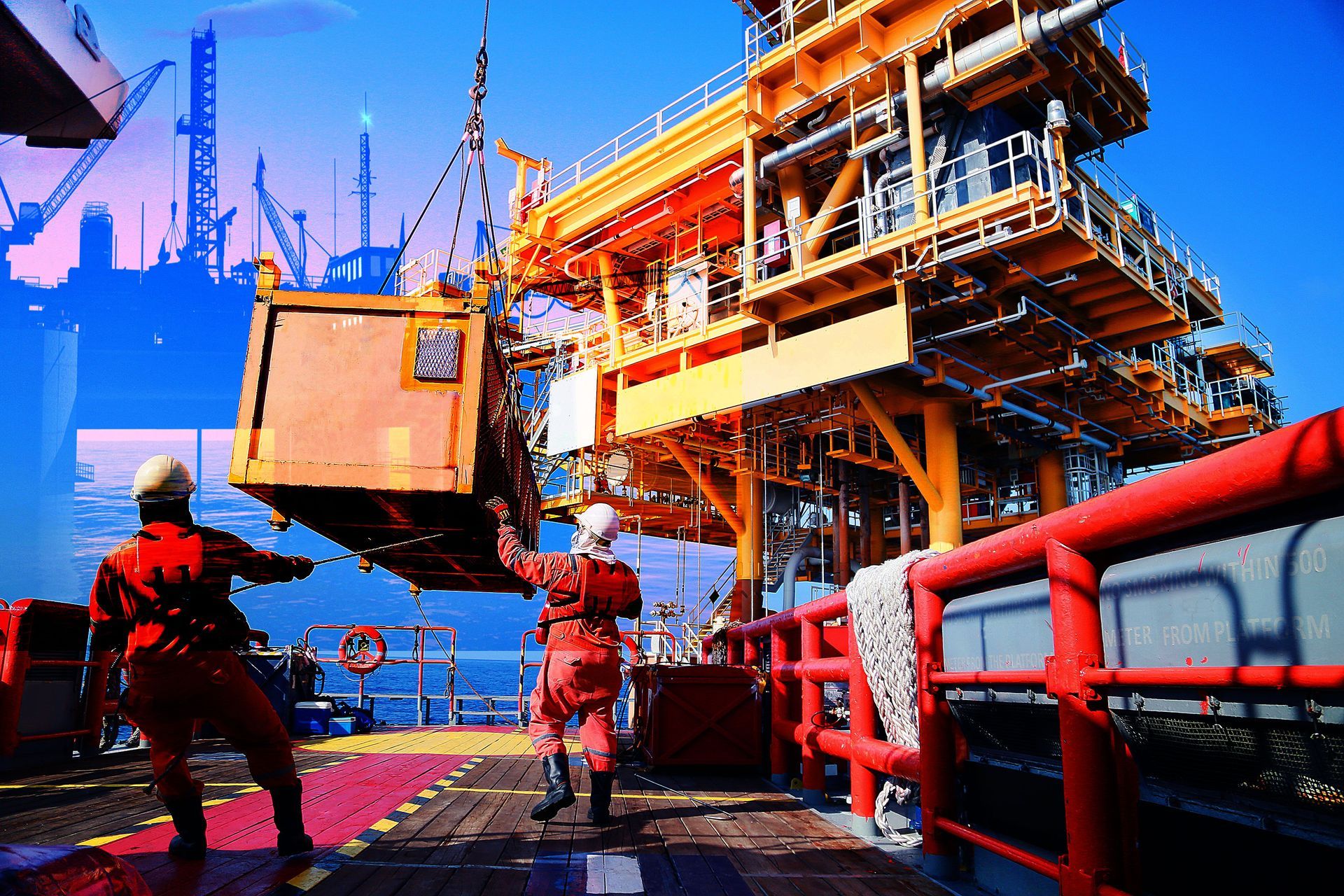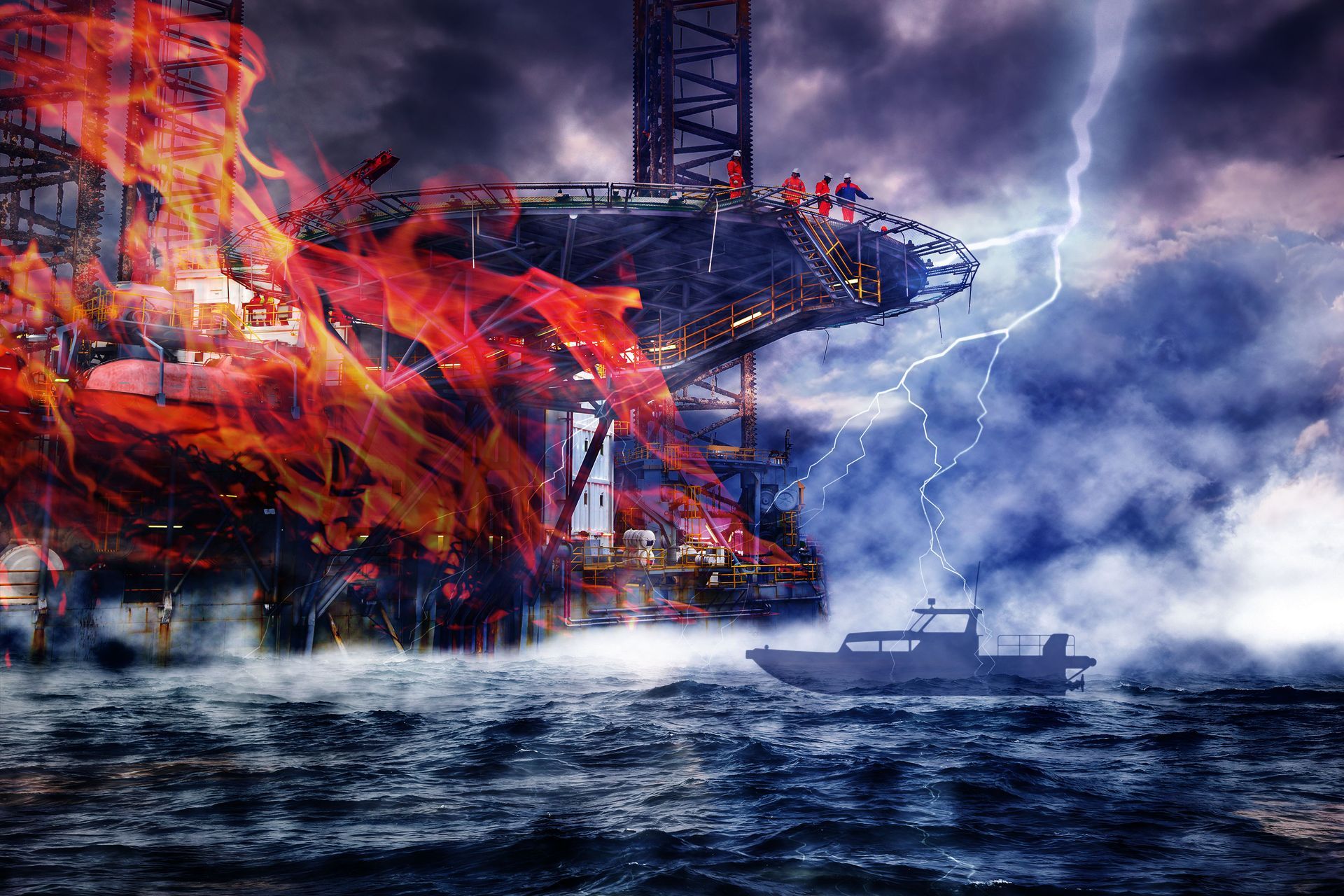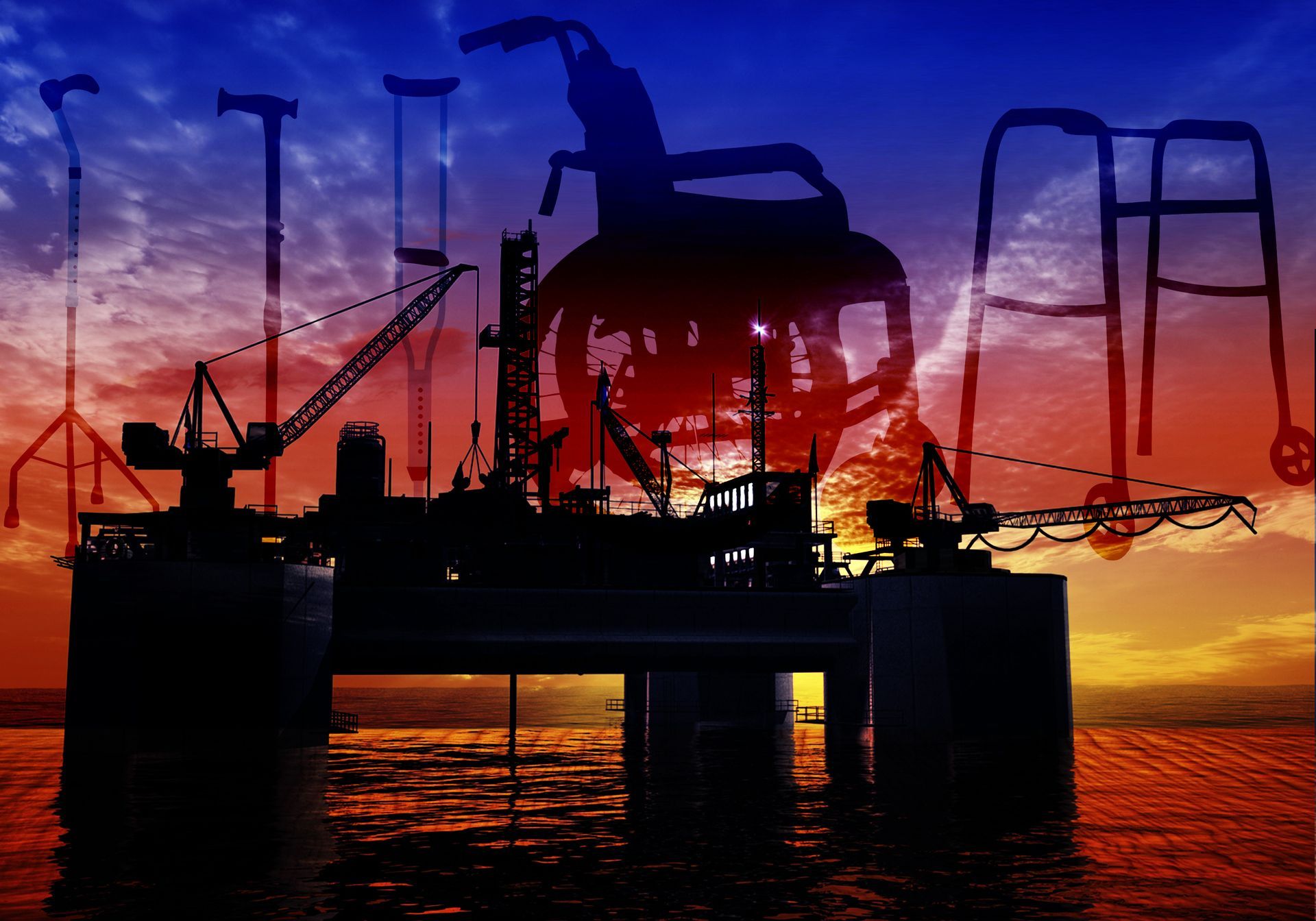LOOKING FOR AN OIL RIG ACCIDENT LAWYER TO REPRESENT YOU?
OIL RIG ACCIDENT LAWYER : OFFSHORE INJURY ATTORNEY
PROTECTING YOUR RIGHTS
LEGAL OPTIONS FOR VICTIMS OF OFFSHORE OIL RIG INJURIES
In our nation’s attempt to achieve energy self-sufficiency, we are allowing an increasing amount of offshore drilling for oil. While oil rigs provide jobs for many Gulf Coast residents, working on these rigs can be extremely hazardous, as evidenced by the high profile BP Deepwater Horizon oil rig accident and the oil spill it spawned. This makes it essential for anyone close to harm’s way to know a skilled oil rig accident attorney. Yes, oil rigs contribute to our economy by providing employment and increasing American oil production, but they pose a grave risk to the life and health of each worker who accepts a job on one.
Offshore oil industry workers regularly face hazardous conditions that can lead to severe injuries or even fatalities. The combination of heavy machinery, volatile substances, harsh weather conditions, and remote locations creates an environment ripe for accidents and injuries where emergency medical assistance is not immediately available.
THE UNIQUE DANGERS OF OIL RIG WORK
Offshore oil rigs are massive structures, often operating around the clock in challenging environments such as the Gulf of Mexico or the North Sea. Workers on these rigs face numerous risks, including exposure to volatile chemicals, extreme weather conditions, and the constant movement of machinery. According to the Bureau of Labor Statistics, the fatality rate for offshore oil and gas workers is seven times higher than the national average across all industries.

FREE OIL RIG INJURY / OFFSHORE INJURY Case CONSULTATION
Take advantage of the free case review by an experienced maritime offshore injury attorney at Gordon & Elias LLP to learn what options are available to help you win a monetary recovery for oil rig injuries. The law firm Gordon & Elias, LLP has a long history of advocating for workers who have been injured in oil rig accidents and offshore environments. Their team of dedicated attorneys understands the complexities of maritime law and is committed to securing just compensation for victims and their families.
We will give you the attention you deserve. Call for an appointment today. We have an office in Houston as well as a Rio Grande Valley office in Edinburg, Texas.
NO UPFRONT FEES
After an oil rig injury do not wait to contact an offshore accident attorney. An experienced maritime lawyer from Gordon & Elias, LLP will review your case and explain your rights for free. Most personal injury lawyers handle cases including oil rig injuries on a contingent fee bases. Therefore the consultation is free, but a percentage on the amount recovered, usually 33.33%, will be taken as our attorney's fee.
Contact Gordon & Elias, LLP today to learn how we can help you recover the compensation you deserve. The consultation is completely free. We handle all the costs of investigating and pursuing your claim, and you only pay us if we recover money for you.
Do not immediately accept an insurance settlement if an insurance company contacts you.
We strongly advise you to first speak with an oil rig injury lawyer. Call us at
(800) 773-6770 to discuss the details of your accident and injury claim right away. We can provide trustworthy legal advice and guide you through the rest of the steps toward obtaining fair and full financial compensation.
COMMON TYPES OF OFFSHORE OIL RIG ACCIDENTS
Offshore oil rig workers face numerous risks daily. Some of the most common types of accidents include:
Blowouts
A blowout occurs when there is an uncontrolled release of oil or gas from a well. This can lead to catastrophic explosions and fires. Blowouts are often caused by equipment failures or human error, such as improper drilling techniques or inadequate training.
Slips, Trips & Falls
The multi-level structure of oil rigs, combined with slippery surfaces and harsh weather conditions, makes falls a significant hazard. The combination of wet, greasy surfaces and the movement of the rig itself can lead to dangerous slips and falls. Falls from heights, such as from a derrick or platform, are particularly deadly. Workers can fall from heights or into the sea, resulting in severe injuries or fatalities
Falls account for about 23% of maritime injuries, with slippages causing 6-12% of reported injuries.
Equipment Failures
Heavy machinery is essential to oil rig operations, but equipment malfunctions can lead to serious accidents. The heavy machinery and drilling equipment used on oil rigs are subject to wear and tear, increasing the risk of mechanical failure. Poor maintenance, defective parts, or operator error can lead to catastrophic incidents, such as explosions or blowouts. These failures can also cause crush injuries, amputations, and other severe injuries. Poor maintenance, defective parts, or operator error can lead to catastrophic incidents, such as explosions or blowouts.
Fires and Explosions
Given the flammable nature of oil and gas, fires and explosions are a constant threat on offshore rigs. A spark, equipment malfunction, or human error can trigger fires or explosions, resulting in serious injuries, fatalities, and environmental damage.
Explosions caused 40% of all reported casualties between 1998-2007, with 4-8% of those explosions being fatal.
Transportation Accidents
Getting to and from offshore rigs often involves helicopter or boat travel. Accidents during these transportation phases can be particularly dangerous due to the remote locations and challenging conditions. Accidents involving helicopters or offshore supply vessels are unfortunately common.
Struck-by Incidents
Workers can be injured when struck by winches, booms, or falling objects. These "struck-by" injuries account for up to 37% of reported accidents.
Chemical Exposure
Offshore workers are at risk of exposure to toxic chemicals, including oil and gas, hydrogen sulfide and other noxious gases. Prolonged exposure to hazardous chemicals can lead to respiratory issues, skin conditions, and long-term illnesses.

COMMON TYPES OF OFFSHORE OIL RIG INJURIES
The nature of offshore work leads to a wide range of potential injuries, varying from minor to life-threatening. Some of the most common injuries include:
Burns
Explosions and fires on oil rigs can result in severe burns, often requiring extensive medical treatment such as skin grafts and reconstructive surgery. Burn victims may also face long-term physical and emotional trauma, including disfigurement and chronic pain.
Traumatic Brain Injuries
Falling objects, slips and falls, or being struck by heavy machinery can lead to traumatic brain injuries. TBIs can result in cognitive impairments, memory loss, and long-term disability.
Spinal Cord Injuries
Falls from heights or being crushed by heavy equipment can cause devastating spinal cord injuries, potentially leading to paralysis or other permanent mobility impairments.
Fractures and Orthopedic Injuries
The physical nature of offshore work, combined with the risk of falls and equipment accidents, often leads to broken bones and other orthopedic injuries.
Amputations
Machinery accidents, such as entanglement in drilling equipment, can result in the loss of limbs, significantly impacting the victim's quality of life and ability to return to work.
Respiratory Issues
Exposure to toxic chemicals and substances can cause both acute and chronic respiratory problems including asthma, chronic bronchitis, and other lung conditions.
Hypothermia
Workers who fall overboard or are exposed to extreme weather conditions may suffer from hypothermia.
Deaths at Sea
Because help in an emergency may be far away and may not arrive in time to save a life. Other accidents, explosions, for example, may cause immediate death on the rig.
LEGAL RIGHTS OF OFFSHORE OIL RIG WORKERS
One of the key factors distinguishing oil rig accidents from other workplace injuries is the role of maritime law in determining compensation. Many oil rig workers qualify as seamen under the Jones Act, a federal law that provides specific protections and rights to individuals injured while working on navigable waters.
UNDERSTANDING THE JONES ACT
The Jones Act allows injured seamen to file claims directly against their employers if their injuries were caused by negligence. This law is vital in offshore injury cases because it enables workers to seek compensation beyond traditional workers' compensation benefits, which are typically limited. Under the Jones Act, victims can seek damages for medical expenses, lost wages, pain and suffering, and disability, resulting in diminished earning capacity. To qualify for protection under the Jones Act, a worker must spend at least 30% of their time in service of a vessel in navigation.
Key components of the Jones Act include:
- Employer negligence: To succeed in a claim under the Jones Act, the injured worker must prove that their employer was negligent in some way. This could include failing to provide proper safety training, inadequate maintenance of equipment, or assigning tasks that exceed a worker’s capabilities.
- Unseaworthiness: Another critical component of maritime law is the doctrine of unseaworthiness, which allows injured workers to file a claim if the vessel, including oil rigs, is not deemed reasonably safe for its intended use. For instance, if faulty machinery or improper safety protocols contribute to an accident, the vessel may be declared unseaworthy.
- Maintenance and cure: Injured seamen are entitled to receive maintenance and cure benefits, which cover basic living expenses and medical costs while they recover. Maintenance refers to financial support for food, shelter, and other essentials, while cure includes medical treatment required to heal from the injury. These benefits are payable regardless of fault and are designed to provide injured workers with support until they reach maximum medical improvement (MMI).
LONGSHORE AND HARBOR WORKERS' COMPENSATION ACT (LHWCA)
The LHWCA provides workers' compensation benefits to maritime employees who are not covered by the Jones Act. This can include workers on fixed offshore platforms. Benefits under the LHWCA include:
- Medical care
- Disability compensation
- Vocational rehabilitation services
OUTER CONTINENTAL SHELF LAMDS ACT (OCSLA)
The OCSLA extends the protections of the LHWCA to workers on the outer continental shelf. This includes most offshore oil rig workers who are not covered by the Jones Act.

STEPS TO TAKE AFTER AN OFFSHORE OIL RIG ACCIDENT
If you've been injured in an offshore oil rig accident, taking the following steps can help protect your rights and strengthen your potential legal claim:
- Seek immediate medical attention: Your health and well-being should always be your top priority after an accident. Even if your injuries seem minor, it’s essential to seek medical evaluation to document the extent of your injuries. This documentation will be critical for any future legal claims.
- Report the incident to your employer: Promptly report the accident to your employer or supervisor and ensure that the details are recorded in an official accident report. Be thorough and specific about what happened, as this report can serve as evidence in your claim.
- Document the accident scene: If possible, take photographs or videos of the accident scene, your injuries, and any contributing factors such as faulty equipment or unsafe conditions. Collect the names and contact information of any witnesses who can provide testimony.
- Consult with a maritime attorney: Maritime law is highly specialized and differs significantly from standard personal injury law. Consulting with an experienced offshore injury attorney at Gordon & Elias, LLP, is critical to ensuring your rights are protected. They can help you determine whether your claim falls under the Jones Act or other maritime laws, such as the Longshore and Harbor Workers' Compensation Act (LHWCA).
- Avoid signing any documents without legal counsel: Your employer or their insurance company may try to get you to sign waivers or accept a settlement offer. It’s crucial not to sign any documents or agree to any settlement before consulting with an attorney who can evaluate whether the offer is fair and adequate.
WHY CHOOSE GORDON & ELIAS, LLP FOR YOUR OIL RIG ACCIDENT CASE?
Gordon & Elias, LLP has a proven track record of success in representing victims of oil rig accidents and offshore injuries. Our attorneys are well-versed in the complexities of maritime law, including the Jones Act, and have secured significant settlements and verdicts for our clients.
- Experience in maritime law: With years of experience handling maritime and offshore injury cases, we understand the intricacies of the Jones Act, the LHWCA, and other relevant laws.
- Personalized representation: Our firm takes a hands-on approach to every case, ensuring that each client receives the personalized attention they deserve. We understand that no two cases are alike and we tailor our strategies to the specific circumstances of each client.
- Negotiate with insurance companies and employers on your behalf
- Represent you in court if a fair settlement cannot be reached
- Maximizing compensation: We are dedicated to securing maximum compensation for our clients. This includes compensation for medical expenses, lost wages, pain and suffering, and other damages.
- No upfront fees: Gordon & Elias, LLP operates on a contingency fee basis, meaning you won’t pay any legal fees unless we successfully recover compensation for you.
If you or a loved one has been injured in an oil rig accident, Gordon & Elias, LLP can help you navigate the legal process and fight for the compensation you deserve. Offshore injuries can be life-altering, and having experienced legal counsel by your side is essential to ensure your rights are protected and your future is secure. Don't delay in seeking legal representation to protect your rights and pursue the justice you deserve.
We have a reputation of bringing respect, professionalism and a personal touch to every injury claim we accept.
Every state limits the amount of time you have to file a claim.
Don't Delay.
Contact the Attorneys at Gordon & Elias, LLP Today to preserve your right to a recovery.
Contact Us
We will get back to you as soon as possible.
Please try again later.
100% FREE CASE EVALUATION
Free Consultation • No Fee If No Recovery



